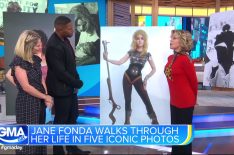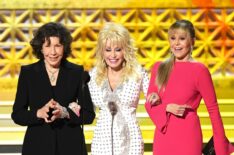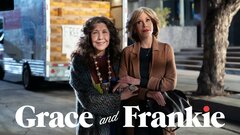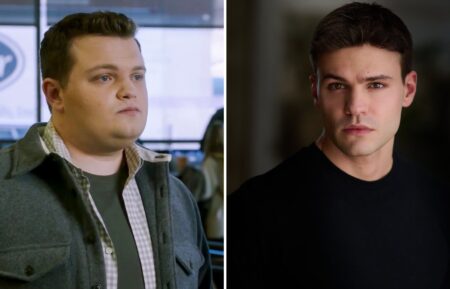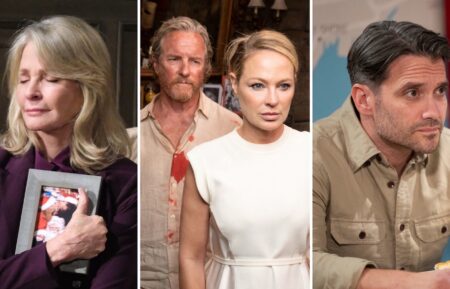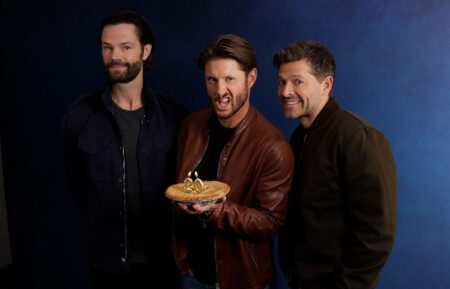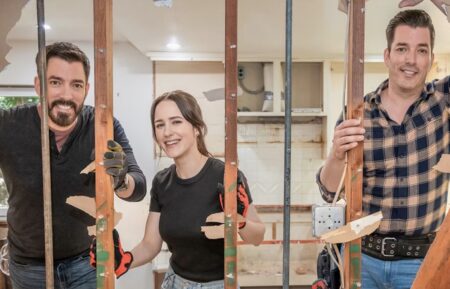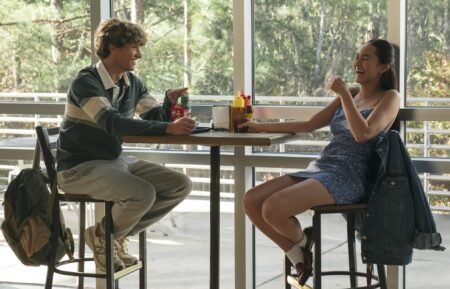Jane Fonda on What She Hopes People Take From HBO’s ‘Jane Fonda in Five Acts’
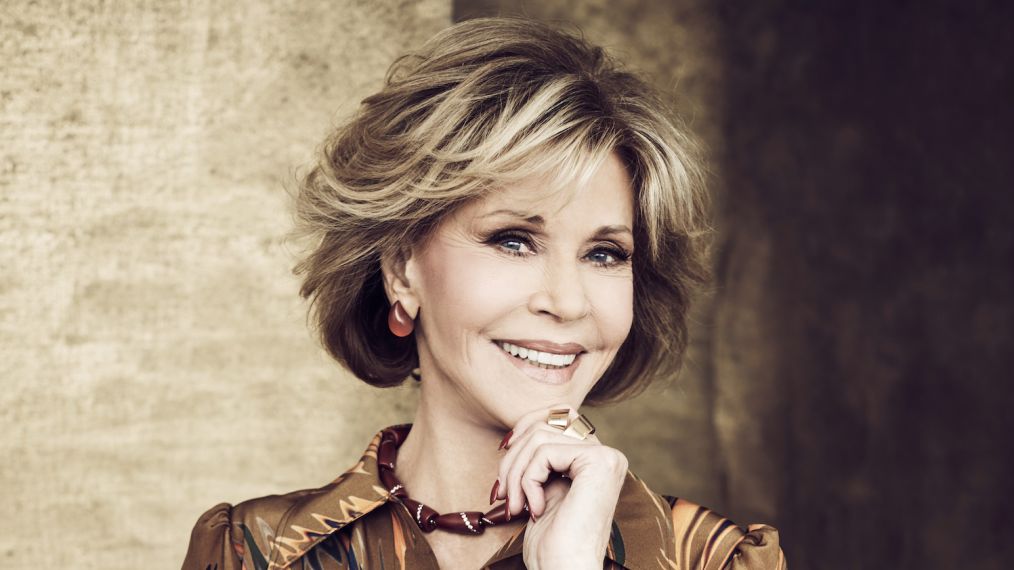
Q&A
Jane Fonda is known for her legendary film career — she’s won two Best Actress Oscars for Klute and Coming Home and starred in hits like 9 to 5, On Golden Pond (with her famous acting father, Henry Fonda) and Monster-In-Law — and a television career (she’s currently starring in Netflix’s Grace and Frankie with bestie Lily Tomlin), as well as an unwavering dedication to being a political activist.
The documentary Jane Fonda in Five Acts premieres Monday on HBO and covers the highs and lows of her personal and professional life. Directed by award-winning documentarian Susan Lacy (Spielberg), the film is broken down in five stages of Fonda’s live, four of those stages being centered around the men in her life including her father and ex-husbands Roger Vadim and Ted Turner. The final act is herself.
The film is not just a walk down memory lane. Fonda herself shapes much of the narrative about her upbringing, closure with mother Frances Ford Seymour, and where she sees herself today.
Fonda and Lacy sat down with TV Insider recently at the Television Critics Association summer press tour to talk about the film and what they hope people take from it.
Jane, because you have covered your life before in your memoir, did you learn anything new in this process in particular?
Jane Fonda: Not really. I wrote my memoir (My Life So Far in 2006) and then I wrote another quite autobiographical book called Prime Time (in 2012) so I had been immersed in the subject of me.
[To Lacy:] Was there anything that took me by surprise that you remember?
Susan Lacy: No, but I think when I asked Jane when she said she wanted to visit her mother’s grave, which she had never done, and I asked if I could go, I think she had some hesitancy. I understood the hesitancy because it’s a very private moment. But I thought it was so key to the story and that was the only thing I said. Jane didn’t see the film until it was finished and I said, “If you don’t like it, or you feel it’s an invasion, I won’t include it.” But you didn’t feel that way. And it was such a touching scene. Such a beautiful day, with the trees. It was such a beautiful shot.
Fonda: What really took me by surprise was how she opened the film. I just thought it was genial to do that. The voice of Richard Nixon, “What is the matter with Jane Fonda?” [Laughs]
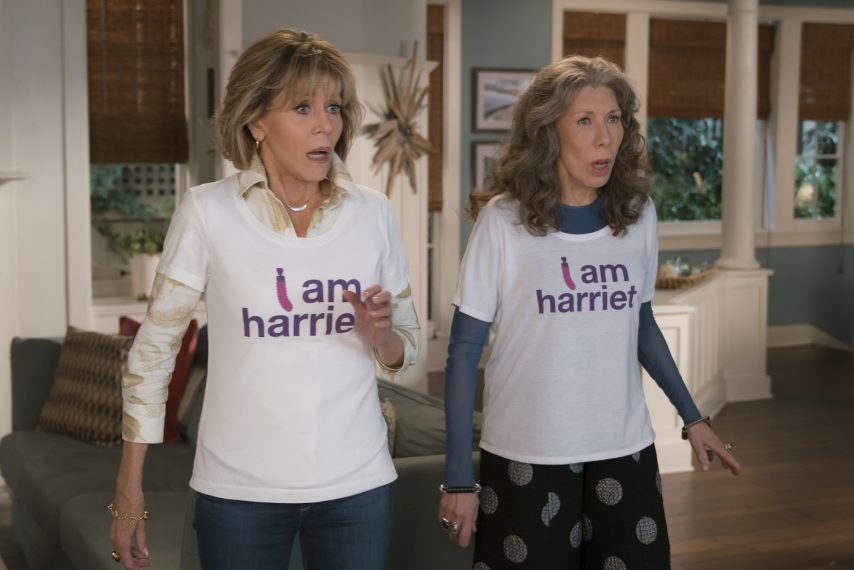
Jane Fonda and Lily Tomlin in Grace And Frankie.
Was that footage out there or was it something you had to dig to find?
Lacy: Well, we had to find it. You had seen a transcript of it, but had you actually ever heard it?
Fonda: No.
Lacy: Actually getting it was a big deal so the minute we got it, I said, “I think I want to start the movie with that.”
The documentary is built around the men in your life — in the five acts, four of them were men and then you’re the fifth act.
Fonda: My life kind of was, in many ways, determined by the men in my life, starting with my father and then my three husbands. And fascinating men, in and of their own — they’ve all had documentaries made about them.
You say early in the documentary that you “never felt real” in your relationships with men. Can you expand on that a little?
Fonda: I always believed that it originated in the relationship I had with my father, where I never felt I was good enough, and in order for him to love me, I had to pretend to be braver than I was. I had to lose a lot of weight because he thought I was fat, all kinds of things like that. And I always thought, “Well, if I really was how I am with him, he won’t love me.” And so that just carried on with my husbands. I moved out and took up residence next door to myself and only brought to the table what I thought that they wanted and left the more interesting part of me behind.
When did you realize you were doing that or did you know it all along but just didn’t know how to not do it?
Fonda: I started to be able to really understand and articulate it when I began to write my memoir.
How do you feel seeing the early footage of yourself, whether it’s early acting roles or your early activism?
Fonda: It’s hard for me to watch the documentary because it’s a warts-and-all documentary. Obviously it’s hard to look at stuff where you think “Oh my god, ew, is that really me?”
As far as your activism, do you see it as kind of running the same track as your acting career or one came from the other?
Fonda: My acting career was started and I think when I became an activist at the age of, I don’t know, 32? 33? I think my acting became better because I saw things in a different way, kind of in a richer way.
Lacy: But remember, when you did They Shoot Horses, Don’t They? That was probably your first really serious dramatic role.
Fonda: Yes, and that was when I was beginning to feel like I wanted to become active politically.
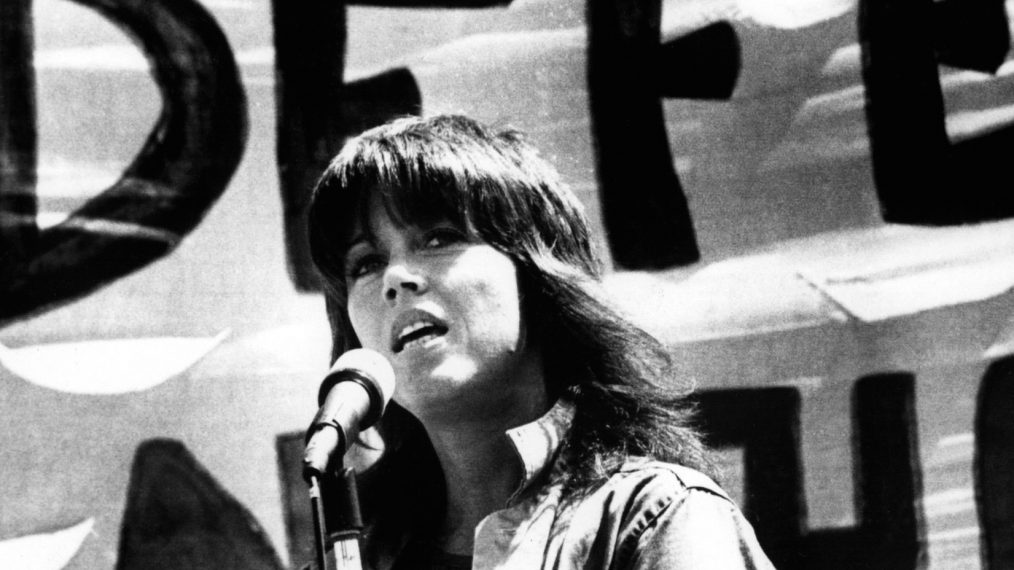
There was a lot of talk about what was controversial and stirred people up, but what do you think you actually did right when you look back?
Fonda: The fact that I became an activist. The fact that I decided I wanted to commit my life to making things better. And Nixon stopped bombing the dykes, by the way. It’s very important for me that people know why I went there. There was a very specific reason and I believe that I succeeded.
In the Dick Cavett interview in the documentary, you didn’t go with a team. You went alone.
Fonda: That was a mistake.
But at the time, did that seem right to you?
Fonda: I never thought about it. I didn’t have very much money and I couldn’t have afforded to bring other people with me. And with a broken foot, by the way! Is that in the movie? I fell at the airport on the way!
Lacy: No, it’s not. I should’ve included it, but Jane broke her foot in the airport on the way there.
Fonda: I got a cast put on my foot in Moscow and I arrived in Vietnam, while it was being bombed, on crutches.
Jane, in the film you say “understanding parents is everything,” which is so true. When did you get that understanding?
Fonda: I’ve spent so much time working on this and researching it. Given that they’re both dead, I don’t think I could learn any more than I have. I think I’ve gotten to the bottom of it and I’ve certainly been able to forgive. I think we spend a lot of our lives thinking about it but I started really doing the research when I turned sixty and was trying to figure out how to do my last three decades.
The last line of the film is “We have to accept and embrace our shadows and sometimes good enough is good enough.” When did you know that would be the last line in the film?
Lacy: Oh, I fought for that. I think it’s very powerful. Listen, I make my own films and I do what I want to do and then I get comments and that was one thing that not everyone that looked at the film thought was the right way to end it. I thought it was exactly the right way to end it.
Fonda: Well, I said that in my book and the response from men was amazing. Men, writing me letters, telling me what that meant, and that really surprised me.
What do you hope people take from the film?
Fonda: Just never give up. You’ll survive, just keep going. And just try to learn the whole way. Just keep learning and understanding what it is that’s happening to you.
Lacy: I think a big takeaway is how liberating forgiveness is and that we can change and we can grow and we become fierce. It’s one of my favorite lines in the movie. Look, Jane is so inspiring that I hope that the whole message of the film will get across, which is we’re not victims. We control our lives and we can do good in this world.
Jane Fonda in Five Acts, Monday, 8/7c, HBO

